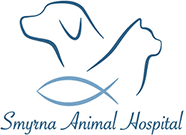The holidays are here! It’s a lot of fun to include your pet in the family festivities, but make sure he or she stays safe. Here, your Marietta, GA vet tells you about some of the most common holiday toxins to be aware of:
Chocolate
Chocolate is found in abundance during the holiday season. As you probably know, it’s very bad for pets. Chocolate of all types—milk, dark, sweet, semi-sweet, white, etc.—contains theobromine and caffeine, chemicals that cause serious health problems in pets even in small amounts. Store all chocolates in sealed containers placed inside closed cabinets or the refrigerator; never leave treats out where pets could gain access.
Candy, Gum, Baked Foods
In addition to chocolate, candies, gum, and certain baked goods are some of the most common pet toxins to be found around the holidays. These items are often sweetened with xylitol, an artificial sugar that is highly toxic to animals. Xylitol poisoning can lead to depression and lethargy, vomiting, diarrhea, seizures, and even coma and death if left untreated. As with chocolate, never leave xylitol-sweetened items out on countertops or tables where pets could swipe them down.
Alcohol
Will your holiday celebrations include alcoholic beverages? Remember that alcohol is very bad for our pets; it affects them the same way it affects us, except that it takes far less to cause serious harm. Restrict your pet’s access to beer, wine, liquor, and champagne. In addition, some foods cooked with alcohol (rum-soaked cakes, for instance) can cause poisoning.
Fatty Foods
Too many fatty, buttery, or rich foods aren’t good for pets. At the very least, they can cause an upset stomach, or possibly vomiting and diarrhea. Too much fat at one time can even lead to a deadly case of pancreatitis! Make sure everyone around your holiday dinner table knows the protocol; no fatty table scraps for Fido. Also beware of toxic foods like onions, garlic, chives, grapes, and raisins.
Holiday Plants
Common holiday plants like poinsettias and mistletoe aren’t necessarily toxic, but they can cause minor health symptoms. Poinsettias, for instance, produce a milky sap-like substance that can cause irritation in the mouth and stomach when ingested. Take care to place holiday flower arrangements or decorative plants in areas where pets don’t have access.
Would you like more helpful tips for keeping your pet safe during the holidays? Contact your Marietta, GA animal hospital today.



